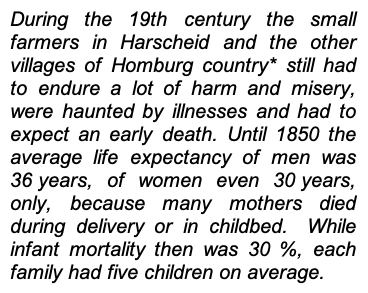During the following years circumstances of life became pretty good. My father got an inheritance from an unmarried brother and later the same thing happened to my mother who, too, got an inheritance from her side. For the money my father bought ground and extended the farm.
Diese Seite
auf Deutsch
auf Deutsch
Start page
Simon - Dax
Simon - Dax
© Kurt Müller 2022
© Kurt Müller 2022
Start page
Simon - Dax
Simon - Dax
Kaspar Heinrich Simon
born 13. May 1818 in Hoff
died 11. February 1884 in Harscheid
died 11. February 1884 in Harscheid
Elisabeth Dax
born 28. October 1814 in Harscheid
died 17. February 1885 in Harscheid
died 17. February 1885 in Harscheid

Simon
Dax





Menü
Epitaph
Here lies in God
Kaspar Heinrich Simon from Harscheid
born May 13th 1818
died Febr. 11th 1884
Blessed are the dead who die in the Lord.
Here lies in peace
Elisabeth Simon née Dax from Harscheid
born Oct. 28th 1814
died Febr. 17th 1885
I took care of the graves for many years but at last the graves had to be given up according to the law. The cemetery changed completely and their last resting place is unknown.
February 10th, 1927


Wilhelm Simon
From Karl Schmitz's book "Chronik von Harscheid" (Chronicle of Harscheid):

